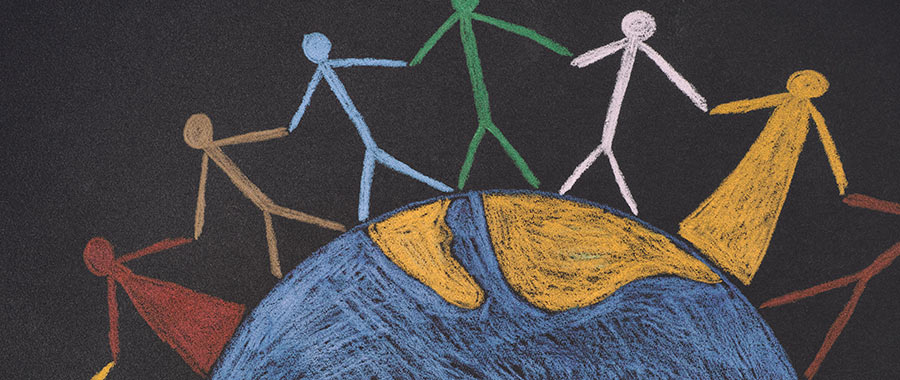In an era characterized by pervasive conflict and disunity, the exploration of lasting peace emerges as a paramount concern. The Bahá’í Faith offers profound insights into the requisite foundations for enduring unity, asserting that a singular, pivotal condition is essential for the establishment of global harmony. This discourse delves into the Bahá’í teachings regarding the vital prerequisites for peace, emphasizing the intrinsic interconnection between humanity and the collective aspiration for unity.
At the heart of Bahá’í philosophy lies the recognition of the oneness of humanity. This principle posits that all individuals, irrespective of nationality, race, or creed, are fundamentally interconnected. The eradication of prejudices, be they racial, religious, or national, constitutes a prerequisite for establishing a peaceful coexistence. The Bahá’í teachings advocate for the cultivation of an attitude of understanding and compassion, which serves as a foundation for dismantling the barriers that have historically separated individuals and communities. Through the lens of oneness, the notion of collective responsibility emerges, urging individuals to engage actively in the pursuit of the common good.
The significance of unity transcends mere social cohesion; it embodies a holistic approach to conflict resolution. Conflicts frequently stem from misunderstandings and entrenched perspectives. The Bahá’í teachings exhort humanity to transcend these limitations by fostering dialogues rooted in empathy and mutual respect. Such dialogues are not only crucial for individual relationships but are also indispensable for international diplomacy. The principles of cooperation and consultation become instrumental in addressing the multifaceted challenges that beset society, thereby facilitating a constructive pathway towards peace.
Another indispensable aspect of the Bahá’í vision for peace is the establishment of a shared moral framework. Ethics serve as the cornerstone of any harmonious society, providing a guiding compass for behavior and decision-making. The Bahá’í teachings emphasize the importance of spiritual education in shaping moral values. Through nurturing virtues such as honesty, justice, and humility, individuals can cultivate a disposition that naturally gravitates towards peaceful resolutions. This educational paradigm is not confined to formal institutions; rather, it encourages informal learning and communal engagement to reinforce shared morals and principles.
The concept of justice is intricately woven into the Bahá’í approach to peace. Justice is not merely a legalistic endeavor but a transformative force capable of engendering profound societal change. The Bahá’í perspective posits that true justice encompasses both the rights and the responsibilities of individuals towards one another. This duality necessitates an active participation in societal affairs, fostering a sense of accountability that extends beyond personal interests. By embracing justice as a communal ideal, individuals contribute to an environment conducive to tranquillity and mutual respect.
Furthermore, economic equity plays a critical role in the realization of lasting peace. The Bahá’í teachings advocate for the eradication of extreme wealth disparities, underscoring the notion that socio-economic inequality serves as a catalyst for unrest. An equitable distribution of resources engenders a sense of belonging and security among individuals, diminishing the propensity for conflict. In this context, the principles of collective prosperity and economic cooperation emerge as vital ingredients in the augmentation of peace. A society that prioritizes the well-being of all its members inherently nurtures an atmosphere of harmony.
The Bahá’í vision extends beyond the present moment; it encompasses a broader narrative of gradual, yet transformative change. Patience and perseverance are essential virtues in the pursuit of peace. The path towards collective unity is often fraught with challenges, yet the Bahá’í teachings emphasize the importance of resilience. Through unwavering commitment to the shared goal of peace, individuals can find strength in the face of adversity. The journey towards unity requires sustained effort and dedication, acknowledging that progress may unfold incrementally.
Moreover, the spiritual dimension of peace cannot be overlooked. The Bahá’í Faith posits that the attainment of true peace is intertwined with spiritual development. Individuals are called to cultivate their inner lives, seeking to transcend egoistic tendencies and align themselves with higher principles. This spiritual evolution fosters a profound sense of interconnectedness, enhancing the capacity for compassion and forgiveness. In nurturing one’s spirituality, the individual contributes to a collective ethos that prioritizes peace, thereby radiating harmony in their interactions with others.
Finally, the implementation of democratic governance principles is paramount in the establishment of lasting peace. The Bahá’í teachings advocate for the democratization of decision-making processes, emphasizing the need for inclusive participation. A genuine democracy nurtures a sense of ownership among individuals and communities, encouraging them to engage in the creation of a just society. By embracing diversity in governance, societies can harness the collective wisdom of their members, fostering an environment conducive to peace.
In conclusion, the Bahá’í teachings elucidate that the prerequisite for lasting unity lies within the embrace of the oneness of humanity, the cultivation of justice, and the commitment to shared moral and ethical principles. The interconnectedness of individuals necessitates a holistic approach to peace, encompassing dialogue, compassion, and common responsibility. As the world grapples with the specter of division and discord, the wisdom of the Bahá’í Faith serves as a guiding light, illuminating the path towards a harmonious future. The aspiration for peace is not merely an ideal; it is a profound responsibility that beckons all of humanity to unite in the pursuit of collective well-being.
